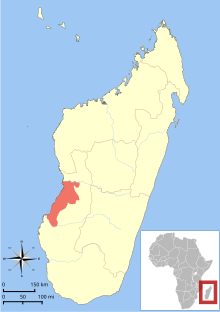| Red-tailed sportive lemur | |
|---|---|

| |
| Scientific classification | |
| Domain: | Eukaryota |
| Kingdom: | Animalia |
| Phylum: | Chordata |
| Class: | Mammalia |
| Order: | Primates |
| Suborder: | Strepsirrhini |
| Family: | Lepilemuridae |
| Genus: | Lepilemur |
| Species: | L. ruficaudatus
|
| Binomial name | |
| Lepilemur ruficaudatus Grandidier, 1867[3]
| |

| |
| Distribution of L. ruficaudatus[1] | |
| Synonyms | |
| |
The red-tailed sportive lemur (Lepilemur ruficaudatus), or red-tailed weasel lemur, is native to Madagascar like all lemurs. It is a nocturnal species feeding largely on leaves, though they also eat some fruit. Individuals weigh around 800 g (1.8 lb), and there is little sexual dimorphism. In general they live in mated pairs, with a home range of about 10,000 square metres. Both members of the pair use the same home range, and there is little overlap between the home ranges of neighbouring pairs. Travel distances each night are between 100 m (330 ft) and 1 km (0.6 mi), making this a relatively inactive species. This species can be found in the Madagascar dry deciduous forests.[4]
Red-tailed sportive lemurs travel in these pairs because it can be difficult for a male to produce roaming strategies and move farther away from the homeland. Therefore, they typically pair up with only one female for reproduction, hence their “partner.” Additionally, these Lemurs don't typically have a strong early warning system, making it difficult for them to warn others or send a signal. Instead, they have grown to develop strong escape mechanisms for them to flee danger. Many studies and experiments have been conducted to produce this information.[5][6][7]
- ^ a b Louis, E.E.; Bailey, C.A.; Frasier, C.L.; Raharivololona, B.; Schwitzer, C.; Ratsimbazafy, J.; Wilmet, L.; Lewis, R.; Rakotomalala, D. (2020). "Lepilemur ruficaudatus". IUCN Red List of Threatened Species. 2020: e.T11621A115566869. doi:10.2305/IUCN.UK.2020-2.RLTS.T11621A115566869.en. Retrieved 19 November 2021.
- ^ "Checklist of CITES Species". CITES. UNEP-WCMC. Retrieved 18 March 2015.
- ^ Groves, C. P. (2005). Wilson, D. E.; Reeder, D. M. (eds.). Mammal Species of the World: A Taxonomic and Geographic Reference (3rd ed.). Baltimore: Johns Hopkins University Press. p. 119. ISBN 0-801-88221-4. OCLC 62265494.
- ^ Ganzhorn, Jörg U.; Pietsch, Thomas; Fietz, Joanna; Gross, Sabine; Schmid, Jutta; Steiner, Nathalie (2004). "Selection of food and ranging behaviour in a sexually monomorphic folivorous lemur: Lepilemur ruficaudatus". Journal of Zoology. 263 (4): 393–399. doi:10.1017/S0952836904005394.
- ^ Fichtel, Claudia (2007). "Avoiding predators at night: Antipredator strategies in red-tailed sportive lemurs (Lepilemur ruficaudatus)". American Journal of Primatology. 69 (6): 611–624. doi:10.1002/ajp.20363. PMID 17245766. S2CID 34229092.
- ^ Fichtel, Claudia; Zucchini, Walter; Hilgartner, Roland (2011). "Out of Sight but Not Out of Mind? Behavioral Coordination in Red-Tailed Sportive Lemurs (Lepilemur ruficaudatus)". International Journal of Primatology. 32 (6): 1383–1396. doi:10.1007/s10764-011-9551-6. PMC 3228940. PMID 22207772.
- ^ Hilgartner, Roland; Fichtel, Claudia; Kappeler, Peter M.; Zinner, Dietmar (2012). "Determinants of Pair-Living in Red-Tailed Sportive Lemurs (Lepilemur ruficaudatus)". Ethology. 118 (5): 466–479. Bibcode:2012Ethol.118..466H. doi:10.1111/j.1439-0310.2012.02033.x. PMC 3491675. PMID 23144523.
